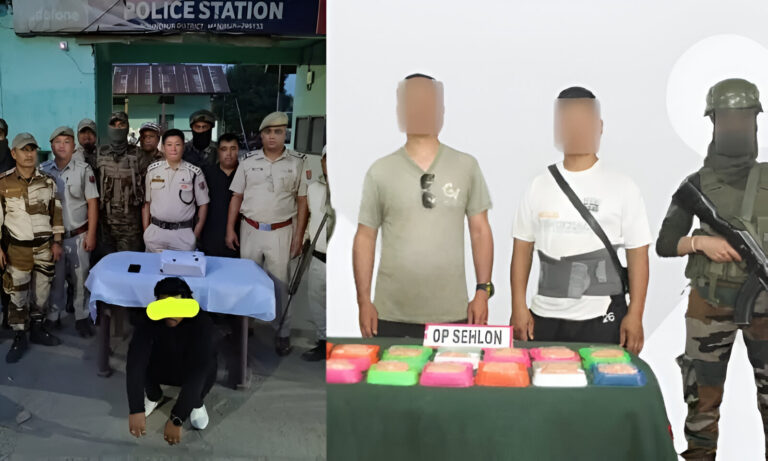Three Arrested in Manipur for Fake Gold Smuggling
News Summary
On May 25, 2025, Manipur Police apprehended three individuals in Kakching district for their alleged involvement in smuggling counterfeit gold. Acting on a tip-off, authorities conducted a raid in the Hangoon area under Mayang Imphal police station, leading to the arrest of Shivaji Gaikwad and Jalindar Shamrao Jadhav from Sangli, Maharashtra, and Ramdas Tanaji Khandare from Howrah, West Bengal. The trio is accused of producing and distributing fake gold bars using specialized equipment to deceive the public. Seized items include a hydraulic machine, melting equipment, graphite crucibles, and various chemicals.
Unmasking the Fake Gold Smuggling Racket in Manipur
Introduction: The Glittering Deception
Gold has always been a symbol of wealth and security. But what if that shiny bar isn’t gold at all? In Manipur, a recent bust has unveiled a sophisticated operation where counterfeit gold was being passed off as genuine, duping unsuspecting buyers. Let’s delve into the details of this elaborate scam.
The Operation: Crafting Fool’s Gold
The arrested individuals had set up a mini-factory equipped with:
- A hydraulic machine
- A NOMAN melting machine
- 94 graphite crucibles of varying sizes
- Carbon rods and holders
- Chemicals like nitric acid
- A MASTECH AC/DC clamp meter
These tools allowed them to produce counterfeit gold bars, complete with fake trademarks, making them appear authentic to the untrained eye.
The Modus Operandi: How They Fooled Buyers
By using impure metals and coating them to resemble real gold, the smugglers created bars that looked and felt genuine. These were then sold to unsuspecting buyers, often at slightly discounted rates to lure them in. The presence of fake trademarks further convinced buyers of their authenticity.
The Bigger Picture: A Growing Concern
This incident isn’t isolated. Across the Northeast, similar cases have emerged:
- In Assam, 160 individuals were arrested over two weeks for involvement in fake gold smuggling.
- In Morigaon, Assam, police seized 2.8 kg of counterfeit gold from three smugglers.
These incidents highlight a growing trend of counterfeit gold operations in the region.
The Impact: Trust Eroded
Such scams have far-reaching consequences:
- Economic Losses: Victims suffer financial setbacks, sometimes losing life savings.
- Market Distrust: Genuine gold traders face skepticism, affecting their businesses.
- Legal Complications: Victims may unknowingly possess counterfeit goods, leading to legal troubles.
Preventive Measures: Staying Vigilant
To avoid falling prey to such scams:
- Buy from Reputable Sources: Always purchase gold from certified dealers.
- Demand Certification: Ensure the gold comes with proper authentication.
- Stay Informed: Be aware of ongoing scams and report suspicious activities.
Conclusion: A Call to Action
The Manipur fake gold smuggling case serves as a stark reminder of the lengths individuals will go to exploit trust. As consumers, staying informed and vigilant is our first line of defense against such deceitful practices.
FAQs
Q1: How can I verify the authenticity of gold before purchasing?
A1: Always buy from certified dealers and request a purity certificate. Using a gold testing kit or consulting with a trusted jeweler can also help verify authenticity.
Q2: What should I do if I suspect I’ve purchased fake gold?
A2: Report the incident to local authorities and provide all transaction details. It’s also advisable to consult with a legal expert to understand your rights.
Q3: Are there specific regions more prone to such scams?
A3: While scams can occur anywhere, recent reports indicate a rise in counterfeit gold operations in the Northeast regions of India, including Manipur and Assam.
Q4: How do counterfeiters make fake gold appear genuine?
A4: They use impure metals coated to resemble gold and often stamp fake trademarks to mimic authenticity. Advanced equipment helps them craft convincing replicas.
Q5: What actions are authorities taking to combat such scams?
A5: Law enforcement agencies are increasing surveillance, conducting raids based on intelligence, and collaborating across states to dismantle these networks.



